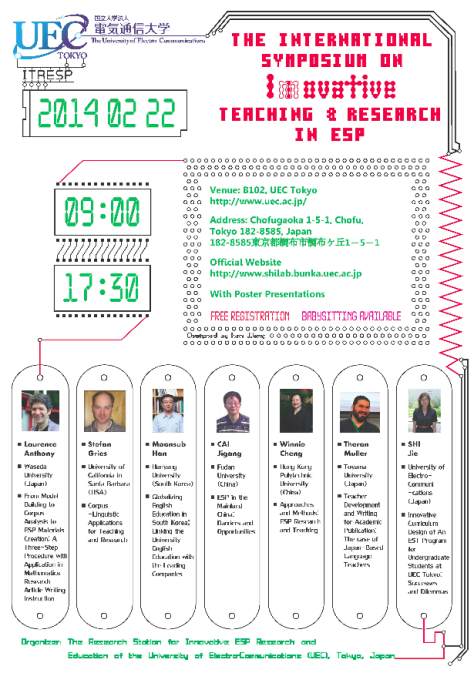The presentation went well, learned a lot and for those who saw please have a look here, presentation posting on the way!
Category Archives: Research in EFL
Reflections on research in EFL particularly in the Japanese context
Fourth Annual Asian Conference on Language Learning April 17-20 2014 in Osaka, references and graditude!
Hello all,
First I want to thank Steve Cornwell and all of the staff, guest speakers, and all the wonderful people I met at the Osaka ACLL/ACTC 2014! I look forward to next years event and I strongly recommend this conference in order to get a broader view of languge teaching practice and research across Asia!
Regarding my presentation, if you would like references to the literature I mentioned please click here.
Also since there has been a lot of interest in what we do with our writing program… here is the pdf of my powerpoint. Enjoy!
In addition, there will be a video coming up soon on how to make an example-driven style of feedback for writing, so please stay tuned….
How to get Copyright Free Images
An excellent blog that begins with the recent news about Getty Images allowing bloggers to embed their pictures without fear of litigation. This is cleverly used as a springboard to discuss the idea of the “fair use” of images, and the myths surrounding it. Also check out a list of sites which enable someone to find unrestricted or creative commons images. I appreciate this since I too use images not only for my work on the Internet, but also for teacher training. While we want to encourage language teachers to adopt images, it is important that they are aware of the issues surrounding the fair use of images. Thank you Teacher Phili, keep up the blogging!
 Usain Bolt – Photo: Alexander Hassenstein / Getty Images
Usain Bolt – Photo: Alexander Hassenstein / Getty Images
Following the news that Getty Images have just taken the decision to allow images (1) on its site available for bloggers to use for free, I thought it would be timely to look at the issue of digital image copyright on the Internet and where you can find copyright free photos and images that you can use to illustrate your blog or other online material which can be seen by anyone.
It’s a massive change of direction from the company, which had previously developed a reputation for being litigious about unlicensed use of its photography, suing small organisations for infringement. Getty has not been able to stop people using and redistributing its images without permission, so it is adopting a more pragmatic approach to the question of how to make money from its images.
Using Getty’s new embed feature, bloggers can…
View original post 1,909 more words
References for poster presentation at The International Symposium on Innovative Teaching and Research in ESP at at the University of Electro Communications, Tokyo・電気通信大学,東京
For those who went to this wonderful symposium last weekend
The references I have in my poster can be found here.
I want to thank UEC, and Professor Shi Jie for holding this event, and I look forward to more in the future.
Poster presentation at The International Symposium on Innovative Teaching and Research in ESP at at the University of Electro Communications, Tokyo・電気通信大学,東京
Greetings fellow teachers, researchers and everyone on the Internet!
I am presenting a poster about my work with in-service Japanese teachers of English for junior and senior high schools at The International Symposium on Innovative Teaching and Research in ESP at the University of Electro Communications, Tokyo, on February 22, 2014. This time the focus will be on a writing workshop at our institution that we offer online using Moodle.
What makes this moodle writing course unique is the fact that we provide three types of feedback:direct, audio and data-driven.
The focus in particular will be on the data-driven part of the workshop and how the participants feel about encountering this type of feedback.
This poster is also a chance for me to engage with other corpus and data-driven learning specialists in the field and get some ideas on how to approach this course with a research agenda, especially one focused on obtaining quantitative, as well as qualitative data.
It is not that I am biased toward qualitative research, but most CALL and data-driven, corpus research has been primarily this way for a long time now. (Chambers 2007, Boulton 2008) and so the demand is high for this type of approach.
The symposium will also host a variety of speakers, Stefan Gries (UCSB, USA),
Winnie Cheng (Hong Kong Polytechnic University, China)Laurence Anthony (Waseda University, Japan), Theron Muller (Toyama University, Japan). Just to meet and talk with anyof these specialists of the field would be a very speciai opportunity indeed.
I also want to thank Shi Jie (Universityof Electro-Communications, Japan) for setting up this symposium. Much appreciation and thanks in advance for her hard work.
If you plan to be at the symposium, please feel free to find my poster. According to the schedule the poster session goes from 2-3:30, so have a chat with me if you are around.
See you there,
Oh p.s.♥ Happy Valentines Day! ♥
********
References
Boulton, A. (2008). Evaluating corpus use in language learning: State of play and future directions. Paper presented at the Amerian Accociation of Corpus Linguisitcs, Brighham Young University.
Chambers, A. (2007). Popularising corpus consultation by language learners and teachers. In E. Hidalgo Tenorio, L. Rodríguez-Navarro, J. Santana (Eds.). Corpora in the Foreign Language Classroom: Selected papers from the Sixth International Conference on Teaching and Language Corpora (TaLC 6). (pp. 3-16). Kenilworth: Rodopi.
Presentation at JALT 2013 in Kobe!
Hello all,
Just wanted to add that coming up this month I and my colleauges of the English teacher training division for the Kanagawa Institute of Language and Culture Studies (神奈川県国際言語文化アカデミアの外国語にかかる教員研修事業. will be giving a forum on our Advanced Leader Teacher program at this coming JALT conference at the Kobe Convention Center, Portopia, Kobe, Hyogo, Japan October 25th – 28th, 2013
The title of the presentation: A Voyage of Reflective Teaching
The Advanced program gathers 20 English teachers who teach in high schools in Kanagawa, supporting them in action research and professional development in order to create “leader teachers” who will be the hub of change and professional development in their schools.
This program has entered its third year and we will present the changes we have noticed in our participants and the process in promoting that change.
Our presentation will be on Monday October 28th, 10:10-11:40 in room 407 at the convention.
For more information:
The presentation abstract:http://jalt.org/2013/abstract.php?p=71
Jalt2013 information (in English and Japanese) http://jalt.org/conference
Our institute (in Japanese) :http://www.pref.kanagawa.jp/cnt/f7807/
Our program (in Japanese) http://www.pref.kanagawa.jp/cnt/f440038/
(in English) http://group14teachers.renshuishere.com/
Stop Trying to Solve Problems
This is a title of an article in the current Psychology Today and I am a little surprised by it. You might agree with me that it does seem a little unconventional, and bombastic for a title. The article claims, based on a psychological study that if we are a little distracted from a problem and then return to that problem later, our minds are more prepared to solve it than if we grit our teeth and concentrate harder and work to solve it.
That is a breath of fresh air for me, since distraction comes easily for me. The article practically legitimizes my “bad” habit. Or does it?
What is interesting is even if we are distracted for a brief moment, our unconscious neural processing kicks in and works on the problem in our moment of distraction.
How can this be applied to a teaching situation I wonder? How can language learners benefit from this? One way is to shift the routine of your classes and ensure that the students have variety of activities rather than stick to one pattern.
Also, shift from a difficult task then have a brief distraction then return to the task later. That may be confusing for students, unless the distraction seems connected with the main task.
What it does confirm is that slight tangents in the teaching process are fine. A story, a joke, even small talk may be necessary for students to process what they are learning. If your classes are a “data dump” of knowledge, a brief distraction may be what your class needs.
Click the link below and see. Many thanks to David Paul for posting this link.
Memory Enhanced by a Simple Break After Reading — PsyBlog
See on Scoop.it – vocabulary learning
I wonder how often we give our students a chance to consolidate what they learn, especially when it comes to vocabulary etc.
If you find it difficult to remember what you’ve read, try this easy technique.
See on www.spring.org.uk
I Hope That “Hopefully” Isn’t Misused
See on Scoop.it – vocabulary learning
This is something I tend to overuse myself. It seems that in order for a language to evolve, some grammatical rules must be “transgressed”. With this example here, it may be an issue of formality vs informality.
“I hope” in more formal documents and “Hopefully” in less formal? This is pure guesswork on my part.
Example No. 4,335,081 of how the English language confounds as it evolves, and the evolution doesn’t necessarily make it better: hopefully. It is an adverb defined as “in a hopeful mann…
How Knowing a Foreign Language Can Improve Your Decisions: Scientific American
See on Scoop.it – Fluency development in Foreign Languages
Thinking in another language changes how people weigh their options…
After reading this it seems that:
You will think more logically in your foreign language rather than in your native one. The idea is that your native tounge will have more emotional resonance rather than your foreign one, which may influnce your decisions and act illogically.
One side that was not considered is the poficiency of the speakers L2. While my Japanese is ok, I wouldn’t be confident to make life-or -death decisions based on this. Maybe that is a logical decision.
See on www.scientificamerican.com





